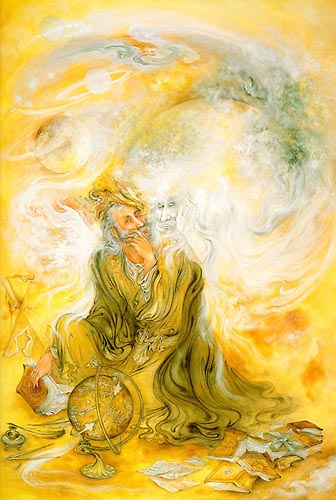The Journey Towards The Art of Learning
By A.S.
At what point is life transformed into the most sacred and holy? When and how does life return to the primordial beginnings of very dust that has fashioned all of life? Further, at what point does the dust become aware of the life it has created and become? The Mind, Body, and Spirit are still great mysteries that have yet to be fully understood. These three components are what compose the human being, and each aspect contains within it pieces of the other. But what are these different parts of the human being, and how can we come to know each part not only separate from the whole, but also in relation to it? The Mind, Body, and Spirit nourish and complement one another in such a way that the discovery of the essence of each requires an intense reflective penetration that can only be experienced through silence. This understanding however is perhaps only for those who have walked along the path of wisdom. For others still seeking this path of understanding do not yet have yet the capacity to comprehend the mysteries of the three-fold being. Hence, the human being who desires to encounter and apprehend the worlds of the Mind, Body, and Spirt, sets out on a journey that does not offer a beaten path. Rather the being that wishes to venture into the vast subconscious abyss, which is the self, does so without the knowledge of where it is going, where it will end up, nor what it will find in the deepest chambers of the self. The Mind, Body and Spirit all ache to be known in essence, but the task to uncover their mysteries demands much more than what the physical world has bequeathed upon the human being. The tools that the journey requires are tools that must be cultivated by the art of learning to learn. Such is the beginning, the middle, and the end of the journey; a continuous, cyclical process of learning.
The art of learning, similar to any other art, cannot be cultivated without immense effort, will, sacrifice, and yearning. Listening, which becomes possible only in the presence of awareness, is the noblest of all arts, for in it is contained lasting understanding through which humility is born and wisdom cultivated. Self-knowledge is the beginning of wisdom. But the beginning of self-knowledge (knowing the essences of Mind, Body, and Spirit) begins with listening. Self-knowledge cannot come about without first having the ability to observe and listen to what the self is saying, doing, thinking, and being. The acquisition of knowledge of the self, demands that the self be listened to. Listening, however, does not exclusively belong to the task of the ear alone, rather listening belongs to the function of one’s entire being. One’s entire being, internal (Mind and Spirit/ metaphysical) as well external (Body/ physical) have the capacity to listen, only in so far as it is allowed. It is only when one’s being is allowed and not weighed down and put to sleep by the various ‘inner attachments’ that make up one’s opinions, beliefs, ideals, prejudices, presuppositions, conclusions, and habits that it is possible for the process of listening with one’s entire being to begin. To listen and to be aware of one’s thoughts, thinking patterns, and the intention behind them, is to be completely aware of all inner and outer movements that one makes. It is only when the intelligence of the human being is not corrupted and destroyed by the conditioned reality in which it lives, that the Mind, Body, and Spirit can be trained to be sensitive enough that listening with totality can begin. It is only when the human being has focused its entire attention towards active observation of the self that they enter a space of awareness. In this state of awareness, all intentions, actions and motives, thoughts, and interactions remain pure and are filled with sincerity. An action in which the self is absent benefits all unconditionally. Awareness then, also is something that is a part of the art of learning.
To learn is to be aware and to be aware is to be alive. To be alive is to be alert and to be alert is to struggle against forgetfulness. To struggle against forgetfulness is to experience pain. To experience pain is to suffer. To suffer is to have sorrow as a companion. To be in the companionship of sorrow leads to endurance. To endure is to be patient. To be patient is to grow and to grow is to learn. To learn is to observe and to observe is to be sensitive. To be sensitive is to listen with totality of one’s being. To listen in totality is to be free of psychological, emotional, intellectual, and physical attachments to one’s history. To be free of one’s psychological, emotional, intellectual, and physical attachments is to be detached. To be detached is to be unconditioned. To be unconditioned is to understand. To understand is to care and to care is to be humble. To be humble is to move towards perfection. To move towards perfection is to transcend male/female configurations, social, cultural, national, political, and economic categorizations. To transcend the impositions that the physical world has burdened the human individual with is to move towards becoming a Human Being and to become a Human Being is to love. Hence, from life love is born, and from life is learned the art of how to love.
Listening, however, first demands silence- a quality that is attained only in the presence of freedom. Only when the mind has completely freed itself of all psychological, emotional, intellectual and physical attachments will listening come into being. In this way, the mind, as it were, is able to stand outside itself to look and observe itself. It therefore becomes a mirror that is constantly polishing itself for clearer reflection of itself. This gives birth to a vision that is void of biases and prejudices. A vision that not only does not compare the present with the past but is also able to look beyond the concepts of good and evil, just and unjust, true and false. The presence of this vision given birth to a human being who is able to honestly, sympathetically, compassionately, critically and intelligently look, listen and learn from one moment to the next. Only for such a Being is it possible to polish the rusted and to guide the lost.
Life, then, is only for those who love and those who have the strength to make love out of life. The constant creative striving towards love-making is that which gives Life to life. Great is the struggle and suffering for the one who loves, for the lover endures in the hopes of creating a life out of that which life has given; this is the battle of the art of loving life. At times Life and love may seem immensely dark, hopeless, and utterly exhausting. Hope and faith, however, must never be lost during periods of hopelessness. NEVER! For indeed, Life is found under the dark ‘cloud of unknowing’. It is, after all, in the presence of utter hopelessness and exhaustion that humility- the creator of selflessness, compassion and love- is born.
Without exception, all human beings are here to learn of only one thing: life. But to learn life, one must first learn love. Life cannot be in the absence of love, and love cannot be without the presence of awareness. Awareness, however, cannot come into being without psychological freedom. This psychological freedom however, takes place only when the Mind, Body, and Spirit have been unshackled from the constraints of their conditioned realities. All that a human being comes to know is acquired through a relative world. A world in which things can only be known in so far as an opposite exists simultaneously. To learn then, in a relative world means to be cognizant of the governing opposing forces that construct the conditioned reality in which one lives. Opposites such as just and unjust, good and evil, right and wrong, true and false are in place to establish various points of reference. The world of relativity is bound by subjective observations, judgements, values, and ideals that shape the life that one lives. Perceiving opposites signifies the existence of judgments, which are the result of psychological attachments and conditioning which signify the absence of freedom. And, in the absence of freedom nothing can be learned though it may appear otherwise. Outside of this subjective relative world however is where objective observation takes place. Objective observation demands that one has access to as many possible subjective thoughts, feelings, ideas, and outcomes in order to choose without condition and understand the world of actuality rather than the world of relativity.
All whose eyes open unto this world must liken this world to a laboratory. Nothing in this laboratory is to be owned by any single being but rather shared by all. The things which have come into being to make up the world in which we live must be looked upon as instruments through which learning becomes possible. The function of the instrumental use of the world is to conduct experiments that lead to an increased, refined, and critical awareness of self. This is not to say that the human being will succeed in every trial but that with the possibility of success also comes failure. The human being must fall again and again until one learns how to stand erect in the midst of all of life’s gifts: sorrows as well as joys, pains as well as pleasures, agonies as well as ecstasies. Every moment of success, as well as every failure, has something profound to offer and teach. It is only in awareness however that learning can take place; one must look, listen, and learn with one’s total being. The human being must engage in the arduous experiments of life and must sacrifice what they think they know for that which they do not so that the art of learning can be mastered.
In short, learning in this laboratory demands the absolute absence of opinions and beliefs. They are signs of immaturity and weakness, since they give birth to fear, confusion, anxiety, fragmentation, hatred, pride, and all sorts of vanities. When the mind is attached to a past experience, it translated and defines the present according to the past, and within this play of the mind, the present becomes the past. Such a Mind is incapable of seeing all that is involved in the present for it is in the habit of experiencing images and memories from the past. These past experiences are not only filled with biases and prejudices, but also, belong to a different conceptuality of time and space. Such a mind projects these past images unto the present. Therefore, not only does the present become distorted and corrupt, but goes wholly and totally unexperienced. This results in one’s involvement in image making, and hence, getting caught in the net of images. Though unconscious this activity may be, it nevertheless is a mechanical network of the mind that blocks all forms of awareness. Such a mind does not perceive with the intent to learn, but with the intent to support its own previous conclusions, prejudices and biases. Everything that does not affirm the prior notion held with the mind’s preconceived notions are tossed aside and looked upon as unsound, false, and unworthy.
In the end, all those who have the strength to experiment in this laboratory are lovers and are able to live and create a Life out of love. They may not succeed in finding answers to the mysteries of man and life, but one thing is for sure: life and love are indeed the greatest of all mysteries!





